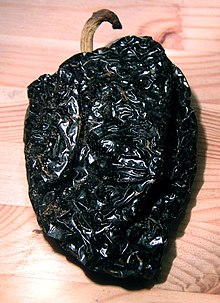ancho
Jump to navigation
Jump to search
See also: anchó
English
[edit]
Etymology
[edit]From Spanish (chile) ancho (literally “wide chile”).
Pronunciation
[edit]- IPA(key): /ˈɑːnt͡ʃəʊ/
Audio (Southern England): (file) - Hyphenation: an‧cho
Noun
[edit]ancho (plural anchos)
- A broad, flat, dried poblano pepper, often ground into a powder.
- 2009 January 30, “Fire-roasted hot chili”, in Toronto Star[1]:
- Add stock, tomato sauce, beans, roasted red pepper, garlic, paprika, ancho powder, ground chipotles and habaneros, cocoa powder, salt and pepper.
See also
[edit]Anagrams
[edit]Asturian
[edit]Adjective
[edit]ancho
Galician
[edit]Etymology
[edit]Pronunciation
[edit]Adjective
[edit]ancho m
Further reading
[edit]- “ancho” in Dicionario de Dicionarios da lingua galega, SLI - ILGA 2006–2013.
- “ancho”, in Dicionario da Real Academia Galega (in Galician), A Coruña: Royal Galician Academy, since 2012
- “ancho” in Dicionário Estraviz de galego (2014).
Old Galician-Portuguese
[edit]Etymology
[edit]Pronunciation
[edit]Adjective
[edit]ancho m
- broad, wide, ample
- 13th century CE, Alfonso X of Castile, Cantigas de Santa Maria, Códice de los músicos, 325 cantiga Cantiga 325 (facsimile):
- Pois a Catiua eſperta. / foi achouſſ en űu camỹo / ancho ⁊ chão ſen pedras / ⁊ andou o mui feſtỹno
- So the smart captive / went and found herself in a path, / ample and flat, without rocks, / and walked through it very quickly.
- Pois a Catiua eſperta. / foi achouſſ en űu camỹo / ancho ⁊ chão ſen pedras / ⁊ andou o mui feſtỹno
Descendants
[edit]Old High German
[edit]Alternative forms
[edit]Etymology
[edit]From Proto-West Germanic *ankwō.
Noun
[edit]ancho m
Descendants
[edit]Portuguese
[edit]Etymology
[edit]Inherited from Old Galician-Portuguese ancho, from Latin amplus. Cognate with Galician ancho and Spanish ancho. Doublet of amplo.
Pronunciation
[edit]
- Hyphenation: an‧cho
Adjective
[edit]ancho (feminine ancha, masculine plural anchos, feminine plural anchas)
- broad, wide
- Synonym: largo
- (figurative) conceited
- Synonym: convencido
Spanish
[edit]Pronunciation
[edit]Etymology 1
[edit]Inherited from Latin amplus. Doublet of amplio.
Adjective
[edit]ancho (feminine ancha, masculine plural anchos, feminine plural anchas)
Derived terms
[edit]Descendants
[edit]- → Papiamentu: hanchu
Noun
[edit]ancho m (plural anchos)
Derived terms
[edit]Related terms
[edit]Etymology 2
[edit]See the etymology of the corresponding lemma form.
Verb
[edit]ancho
Further reading
[edit]- “ancho”, in Diccionario de la lengua española, Vigésima tercera edición, Real Academia Española, 2014
Anagrams
[edit]Categories:
- English terms borrowed from Spanish
- English terms derived from Spanish
- English 2-syllable words
- English terms with IPA pronunciation
- English terms with audio links
- English lemmas
- English nouns
- English countable nouns
- English terms with quotations
- en:Peppers
- Asturian non-lemma forms
- Asturian adjective forms
- Galician terms inherited from Latin
- Galician terms derived from Latin
- Galician terms with IPA pronunciation
- Rhymes:Galician/antʃo
- Rhymes:Galician/antʃo/2 syllables
- Galician lemmas
- Galician adjectives
- Old Galician-Portuguese terms inherited from Latin
- Old Galician-Portuguese terms derived from Latin
- Old Galician-Portuguese terms with IPA pronunciation
- Old Galician-Portuguese lemmas
- Old Galician-Portuguese adjectives
- Old High German terms derived from Proto-Germanic
- Old High German terms inherited from Proto-Germanic
- Old High German terms inherited from Proto-West Germanic
- Old High German terms derived from Proto-West Germanic
- Old High German lemmas
- Old High German nouns
- Old High German masculine nouns
- Portuguese terms inherited from Old Galician-Portuguese
- Portuguese terms derived from Old Galician-Portuguese
- Portuguese terms inherited from Latin
- Portuguese terms derived from Latin
- Portuguese doublets
- Portuguese 2-syllable words
- Portuguese terms with IPA pronunciation
- Portuguese lemmas
- Portuguese adjectives
- Spanish 2-syllable words
- Spanish terms with IPA pronunciation
- Rhymes:Spanish/antʃo
- Rhymes:Spanish/antʃo/2 syllables
- Spanish terms inherited from Latin
- Spanish terms derived from Latin
- Spanish doublets
- Spanish lemmas
- Spanish adjectives
- Spanish nouns
- Spanish countable nouns
- Spanish masculine nouns
- Spanish non-lemma forms
- Spanish verb forms
- es:Size